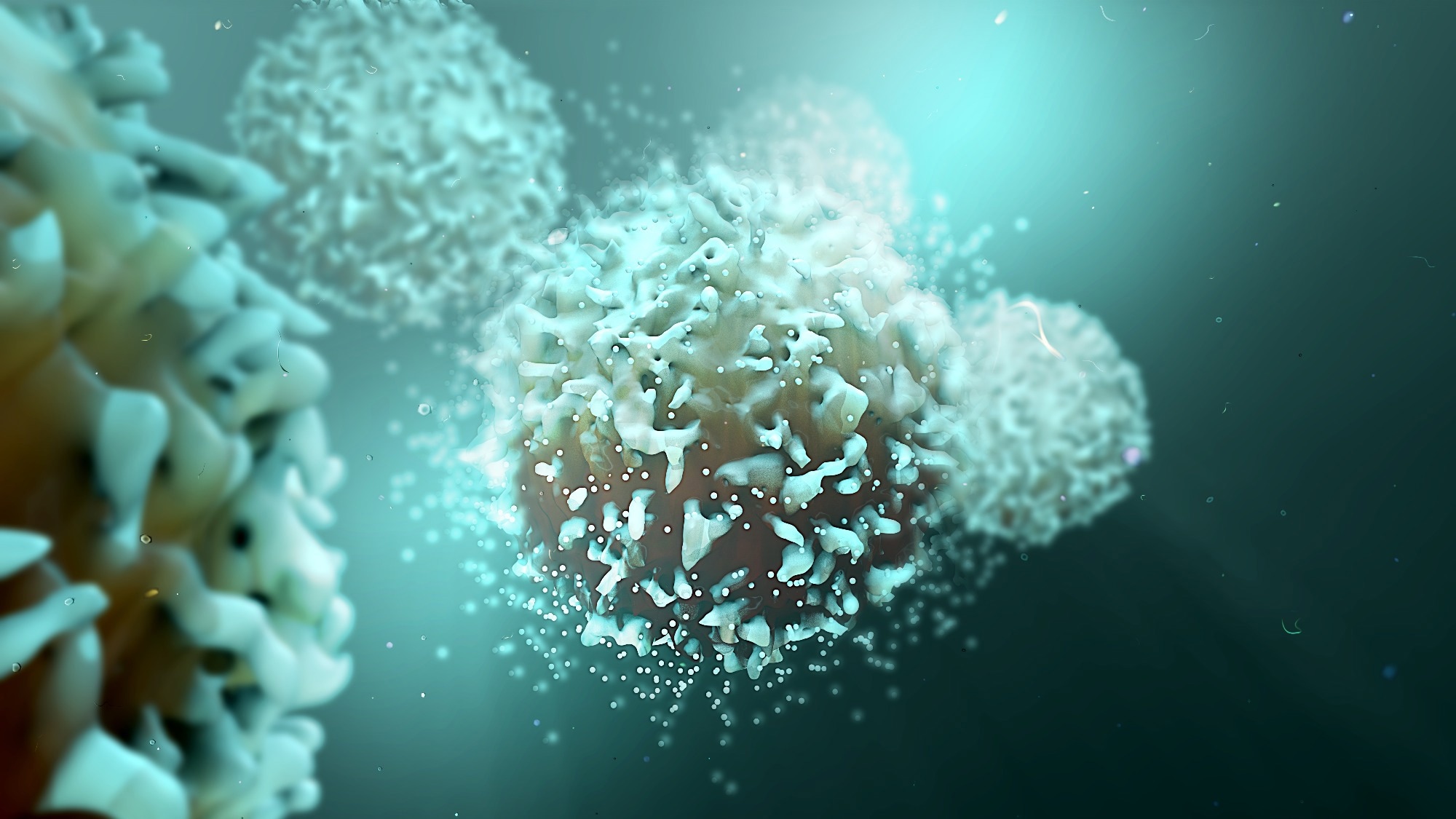In a recent study published in the journal Immunity, a team of researchers from the United States found that previous severe acute respiratory syndrome coronavirus 2 (SARS-CoV-2) infections reduce the activation and expansion of CD8+ T cells in response to coronavirus disease 2019 (COVID-19) vaccinations.
 Study: Robust T cell responses to Pfizer/BioNTech vaccine compared to infection and evidence of attenuated peripheral CD8+ T cell responses due to COVID-19. Image Credit: Design_Cells / Shutterstock
Study: Robust T cell responses to Pfizer/BioNTech vaccine compared to infection and evidence of attenuated peripheral CD8+ T cell responses due to COVID-19. Image Credit: Design_Cells / Shutterstock
Background
The messenger ribonucleic acid (mRNA) COVID-19 vaccines such as BNT162b2 developed by Pfizer/BioNTech have exhibited high levels of protection against SARS-CoV-2 infections with robust stimulation of the adaptive and innate immune responses. T cells play a vital role in the viral clearance of SARS-CoV-2 and in controlling the infection. Furthermore, abortive SARS-CoV-2 infections have been seen to induce cross-reactive T cells to expand rapidly, suggesting that T cells also play a protective role against SARS-CoV-2.
The studies that have examined the durability of T-cell responses against SARS-CoV-2 have been few and have relied mainly upon using peptide stimulation in vitro and bulk measurements. These methods are inefficient in determining the immunodominant epitopes and often underestimate the epitope-specific T-cell frequencies. Using multimers of peptide-major histocompatibility complexes (pMHCs) can efficiently estimate the epitope-specific T-cell responses.
About the study
In the present study, the researchers used spheromers — a platform comprising 12 pMHCs that can detect three to four-fold more antigen-specific T cells as compared to other multimers — to determine the T cell epitopes that are dominant after vaccination with the mRNA COVID-19 vaccine BNT162b2. A panel consisting of 49 SARS-CoV-2 epitopes, including non-spike and spike proteins from the ancestral SARS-CoV-2 Wuhan-Hu-1 strain, was used to evaluate blood samples spanning periods from pre-vaccination to four months following the second dose.
Two cohorts of COVID-19 patients were examined for T-cell responses to determine the differences between responses elicited by the vaccine and SARS-CoV-2 infections. The CD8+ T cell responses specific to the spike protein were measured first in the blood samples from vaccinated individuals who had no prior SARS-CoV-2 infections. The spike-specific responses of CD8+ T cells were also surveyed in blood samples obtained at different time points after vaccination.
Additionally, peripheral blood mononuclear cells (PBMC) collected from unvaccinated individuals one year before the onset of the COVID-19 pandemic were used to determine the
SARS-CoV-2 epitope baseline frequency. These PBMCs were stimulated with peptides similar to the dominant SARS-CoV-2 epitopes and used to determine the functional capacity of CD8+ T cells specific to SARS-CoV-2 antigens.
Furthermore, the cytokine profile of CD8+ T cells specific to the SARS-CoV-2 spike protein was evaluated using 28 PBMCs stimulated with the dominant peptide. The CD8+ T cell responses of vaccinated individuals who were SARS-CoV-2 naive were compared to those who had COVID-19 to understand the differences in vaccination and natural infection based anti-SARS-CoV-2 T cell immunity. Additionally, the memory T cells of these two cohorts were compared at different time points, and the effects of SARS-CoV-2 infection and COVID-19 vaccination on CD4+ T cells were also measured.
Results
The results reported that COVID-19 vaccination elicited robust T-cell responses against the SARS-CoV-2 spike protein for the dominant CD4+ and CD8+ T-cell epitopes. The antigen-specific CD4+ T cell responses peaked one week after the second dose of the BNT162b2 vaccine, while the CD8+ T cell responses peaked after two weeks. These results were in contrast to previous studies that reported synchronized peaks in CD4+ and CD8+ T cell response following vaccination.
Compared to individuals who had COVID-19, the T cell responses in SARS-CoV-2 naive vaccinated individuals were significantly higher. The circulating T cells specific to the SARS-CoV-2 spike protein were lower in frequency after SARS-CoV-2 infections than after COVID-19 vaccination.
The virus-specific T cells were also qualitatively different, with COVID-19 vaccination stimulating a rapid effector T cell induction, which decreased by the third month and coincided with the increase of memory T cell frequency. However, in COVID-19 patients, very low levels of the CD8+ memory T cells specific to the virus could be detected even five months after the onset of COVID-19 symptoms.
Although the CD4+ T cell responses to vaccination were not affected by previous SARS-CoV-2 infections, a 3.5-fold to 54.1-fold decrease in circulating CD8+ T cell frequencies were observed due to prior COVID-19, and the functionality of the CD8+ T cell was also attenuated in comparison to vaccinated individuals who were SARS-CoV-2 naive. These findings indicated that SARS-CoV-2 infections could have a long-term impact on the patient’s immune system even after viral clearance.
Conclusions
Overall, the results suggested that previous SARS-CoV-2 infections reduce the CD8+ T cell responses to mRNA COVID-19 vaccines, although the CD4+ T cell responses were unaffected. The reduced CD8+ T cell responses to vaccination indicate that individuals who have had prior SARS-CoV-2 infections could be vulnerable to subsequent infections despite being vaccinated.
Journal reference:
- Gao, F., Mallajoysula, V., Arunachalam, P. S., van, Manohar, M., Röltgen, K., Yang, F., Wirz, O., Hoh, R., Haraguchi, E., Lee, J., Willis, R., Ramachandiran, V., Li, J., Kathuria, K. R., Li, C., Lee, A. S., Shah, M. M., Sindher, Sayantani B, & Gonzalez, J. (2023). Robust T cell responses to Pfizer/BioNTech vaccine compared to infection and evidence of attenuated peripheral CD8+ T cell responses due to COVID-19. Immunity. https://doi.org/10.1016/j.immuni.2023.03.005, https://www.sciencedirect.com/science/article/pii/S1074761323001255